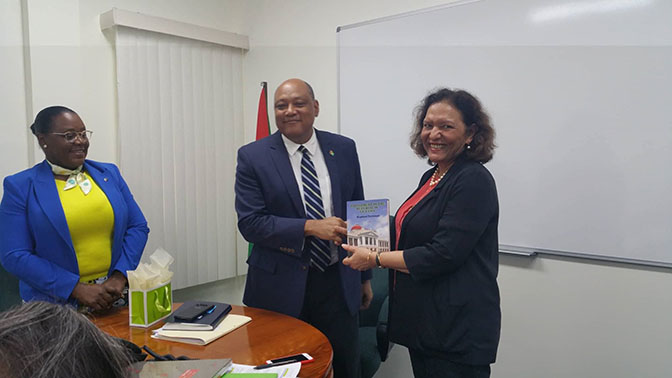Guyana has asked the World Bank for US$1.7M of a US$20M loan it has accessed to set the foundation for its petroleum industry framework and to also study bringing natural gas onshore when oil production begins in 2020.
Minister of Natural Resources Raphael Trotman told reporters following a meeting with World Bank representatives at his Duke Street office yesterday morning that his ministry would be “the receiving ministry” until such time as the proposed Department of Energy (DOE) is up and running.
He explained that the World Bank has put strict criteria for accessing the funding and it is for this reason that a Project Implementation Unit (PIU) has been established within the Ministry of Finance.
“To be able to get the advance financing that the minister of finance has asked for, the World Bank has said that there must be this unit up. So the sooner we get this unit it is the sooner we can get an advance…We must have procurement capacities, we must have a coordinator and a financial director. Once those are in place we can receive the advance and the larger tranche will be forthcoming towards the end of the year,” he added.
The Natural Resources Minister could not readily say what the terms of the loan were as he explained he did not have the actual loan document with him yesterday morning “but suffice to say it is very favourable terms”.
He pointed out that the loan caters for three components. “It has three components, enhancement of the strategic legal and regulatory frameworks, institutional set up and capacity building, programme management and coordination and to a larger extent that would be the gas,” he said.
Minister of Finance Winston Jordan has said that government will be channeling the bulk of the loan towards capacity building and hiring of skilled personnel and training to maximize oversight of the sector. He had pointed out that part of the loan would go towards looking at legislation “that we would be required to put in place to improve the architecture for the oil and gas sector.”
Trotman yesterday said that part of the US$1.7M will be used for a study on bringing natural gas onshore for local energy needs.
“I know that Minister (of Public Infrastructure David) Patterson and the Ministry of Public Infrastructure are well engaged with Exxon in bringing the gas to shore so it is very important that we get technical support and advice that is needed from the World Bank and outside of the World Bank,” he said.
“We have had desktop studies, but we now have to go further and actually work out the actual generation aspects onshore, what equipment for GPL for example…there is a lot of work to get done. We have done an identification of the location, which is at Woodlands on the East Coast of Demerara but the work now in terms of for example, the pipeline, the width of the pipeline, say if 12 inches as opposed to 14 inches, where will it land, which company is going to take it there, is it General Electric, is it Wartsila, is it GPL by itself? These are decisions that have to be made and they can’t be made in a vacuum, so we need an in-depth study,” he added.
Some of the US$1.7m will go towards strengthening Guyana’s regulatory and legislative framework for the oil and gas sector.
Pointing to the lack of legislative and other frameworks geared for a petroleum sector, Jordan had said that the government would move swiftly to ensure that mechanisms are in place to cater for first oil in 2020 and production beyond. “We have none like local content, SWF [Sovereign Wealth Fund], Petroleum Commission Bill, Petroleum Fiscal Regime legislation and plus we don’t have people to draft them. So, under this loan, we have to bring people to help us draft these pieces of legislation,” he added.
Trotman yesterday informed that it was only on Monday that himself and the other members of President David Granger’s ‘Quintet’ of ministers held a workshop to discuss the funds and the Petroleum Commission Bill formed a major part of that forum.
“It [the US$20M] is really for oil and gas capacity building , strengthening the regulatory framework and working with the government…bringing the gas to shore and the other one is just capacity building . That is why we held a workshop yesterday with the ministers to brainstorm the whole idea of the department of energy and how it can be framed and of course as a companion to that the petroleum commission bill.
“I should add that since we put (the petroleum commission bill) in parliament last year, the World Bank had asked that we stall, not necessarily stall but if we could wait their inputs. Those inputs came at the end of February so we discussed with them today the way forward. They have committed to providing an expert to do the redraft. They had provided comments but the actual redraft is what is needed now and the intention is to have the bill back before the house, either a complete redraft or a new bill by June of this year.
With an expert already identified by the World Bank to help in this regard, Trotman said that government has offered to pay the person to quicken the process so that the June deadline could be reached.
The Natural Resources Minister said that government plans to, with all recommendations it has received on the current Petroleum Commission Bill, incorporate the World Bank’s expert assistance and have all synthesized into one workable draft to share it with the stakeholders.
Following that process, government will meet with the various stakeholders, have the draft published on its website for feedback and then hold national consultations again before it is taken back to the National Assembly.





